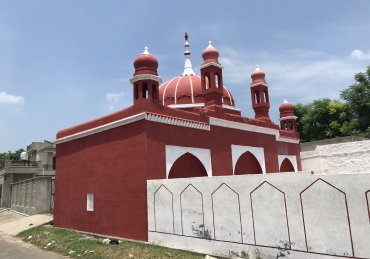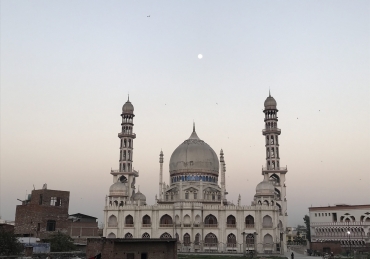بسم الله الرحمن الرحیم
Over the past few years, I have travelled to India several times and visited various Madāris and Masājid in different states. The accounts of some of the visits have been published online on www.nawadir.org. They highlight some of the challenges and difficulties facing the Muslims. One of the challenges is the oppressive way in which many ʿUlamāʾ are treated and remunerated. The silent plea of ʿUlamāʾ has been ignored for too long. The purpose of this brief article is not to undermine or diminish the important role of our institutions as they are integral in propagating and protecting our faith. Rather, the aim is to encourage the sector to evaluate its practices and bring about change by recognising the needs of employees, valuing knowledge and its bearers, and realising the benefits of investing in people. Fortunately, a small minority of institutes have started reforming their approach but there is a long way ahead.
As I travelled across India visiting some magnificent Madāris, I realised there exists a somewhat hypocritical justification of underpaying teachers and employees. Common justifications include simplicity, adhering to the ways of the pious predecessors, limited funding and encouraging teachers to stay content with less. In many institutions, the salary of full time Qurʾān teachers – who are remunerated the least as though the teaching of the Qurʾān is the least important – is between £30 and £50 a month. One can estimate how much the cleaners and caretakers are remunerated. Undoubtedly, some institutions struggle with finances. However, I did not come across any seminary in the seven states of India I visited that could not afford better salaries. This is clearly evident in the state of the art buildings that cost hundreds of thousands – and often million – of pounds. If such buildings were a prerequisite to imparting knowledge, the mother of institutes Darul Uloom Deoband would not have started under a pomegranate tree. Our pious predecessors invested in people. Simplicity should not be used as a smokescreen to circumvent responsibility.
Talking to ʿUlamāʾ provides some practical perspective and illustrates the consequences of this continuing trend. Morale is generally low. Some complain about the way they are treated and the difficulties they encounter. Living costs in India have spiralled. The complainants include senior teachers who along with their juniors continue to work with sincerity, commitment and devotion. Unfortunately, some institutes seek unjustifiable favours such as forcing teachers to undertake donation collections in holidays. This contravenes Islamic teachings and is a dereliction of duty. Some teachers are forced to seek assistance from other sources for basic necessities. For many, the remuneration is simply insufficient to make ends meet. If a family member falls ill, the annual remuneration is insufficient to fund the treatment. Many such families have no choice but to seek charitable assistance and Zakāh donations. It is unfortunate that many ʿUlamāʾ with a full time job are reliant on charitable assistance. Another consequence of the underpayment is that it often breeds certain traits. This develops a negative view of ʿUlamāʾ and diminishes their value in peoples’ eyes. This is particularly visible across the Indian sub continent and is further influenced by the consequences of the parallel education system.[1]
Our institutes should be at the forefront of fulfilling employees’ rights and empowering them as opposed to subjugating them or impoverishing them. We should serve as an inspiration to non-Muslims. The position of an Imam and a scholar should be honoured and dignified. This does not necessitate an extravagant package. The remuneration should be decent and sufficient; enabling employees to fulfil their basic needs without having to resort to other sources of income and enabling them to devote their time fully to teaching and serving the faith. These needs include medical and educational needs of the employees and their families. On the day of judgement, Almighty Allah will remind a servant that had he visited and cared for the sick, he would have found Allah by the sick person (Ṣaḥīḥ Muslim, 2569). Likewise, seeking knowledge has been deemed obligatory on every Muslim (Sunan Ibn Mājah, 224).
Islam has placed great emphasis on the rights of employees. The Prophet ﷺ said, “Give to the worker his wages before his sweat dries” (Sunan Ibn Majah, 2443; Sharḥ Mushkil al-Āthār, 3014). Almighty Allah mentions, “O you who believe, stand firmly for justice” (Qurʾān, 4: 135). The general welfare of employees is the moral responsibility of employers. Almighty Allah mentions: “Do good to those whom your right hand possess” (Qurʾān, 4: 37). The Prophet ﷺ said, ““Each of you is a shepherd and each of you is responsible for his flock” (Ṣaḥīḥ al-Bukhārī, 893).
Unfortunately, this trend of underpaying ʿUlamāʾ migrated to the UK with our forefathers. In the initial period, this was understandable due to limited finances and the difficulties they endured. The trend has however continued despite the prosperity of our communities. It is a sad reality that we are able to afford millions of pounds for grand structures and buildings, yet, many organisations are unwilling to pay the minimum wage to its employees. How can we expect a family to live on £100 a week? We can only blame ourselves as we are giving others an opportunity to demonise Islam and interfere into and regulate our institutions. Unfortunately, it has become common for many ʿUlamāʾ to work for twelve hours a day, which inevitably has an impact on the quality of teaching due to fatigue and inability to conduct detailed reading on the subject matter. We often complain about the quality of teaching in our institutes but do not give consideration to how teachers can dedicate their time to preparing and delivering quality lessons.
Many people complain that most Imams do not fulfil their role. Undoubtedly, there is some truth to this. My respected father Mufti Shabbir Ahmad mentions that if the Imams recognised their responsibilities and fulfilled their roles, half of our problems would be resolved. It is also a fact that that many talented ʿUlamāʾ are not willing to become Imams and teach in institutes. However, as a community, have we ever thought about how much we remunerate scholars? Have we relieved the scholar from all his worries so that he can fully devote himself to the serving the community? Have we valued the talented scholar or have we perceived his talent as a threat? The scholar is also a human being who has a family with needs. Along with the Imam, why is it that we cannot – or rather do not – appoint social workers, psychologists, youth workers and counsellors in our Masājid. From amongst the signs of Qiyāmah is competing in building lofty mosques. We invest millions of pounds in building grand buildings yet we are failing to invest in developing and nurturing the next generation of Muslims. Who will, after all, fill these grand buildings in the years to come? The buildings in Cordoba and Samarqand are by far more grand and magnificent but they are empty today. When Islam was at its peak in the time of the Prophet ﷺ, the structure of Masjid Nabawī hardly changed. The priority and focus was on developing people. Many mosques and institutes are taking proactive steps to address these issues and focus on the needs of ʿUlamāʾ. However, there is a long way ahead. Undoubtedly, remuneration alone will not resolve all of our challenges. Nonetheless, this is part of a wider challenge of changing the mindset and aligning the role of the mosque to the communal role that Masjid Nabawī played in the time of the Prophet ﷺ.
It is also important for ʿUlamāʾ to always remain content with what they are given even if little. Allah is the one who provides sustenance and instils blessings. There is no need to revolt or instigate trouble. Irrespective of the remuneration level, ʿUlamāʾ should continue to serve with passion, commitment, sincerity and devotion. Imams in particular should not regard their duty as being confined to leading prayers and organising a few programmes in a year. Rather, the Imam has an integral role in developing and leading the community. This issue should therefore not be used as an excuse to circumvent our religious responsibility towards the communities we serve. The sacrifices of our pious predecessors are well documented. Simultaneously, the responsible people of institutes need to recognise their Islamic and moral responsibility towards employees. We need to ensure that ʿUlamāʾ are remunerated appropriately and that priority is given to developing people over building grand structures. To achieve this, the following are some recommendations by way of conclusion:
- Employees should be consulted regularly to ensure their remuneration level is appropriate and their needs are ascertained. There should be mutual understanding, respect and appreciation between employers and employees.
- Remuneration levels should be set independently from any external sources of income. A full time employee should not be left dependant on another source of income. There should be no underlying assumptions in this regard. Some may not wish to acquire state benefits whilst others may not be eligible.
- Organisations in the UK should adopt the living wage, or at least, the minimum wage, as the minimum baseline to remunerate employees. Similar indicators may exist in India and other countries or could be ascertained and adopted.
- Organisations should minimise the obsession with grand structures and prioritise people development.
I pray to Almighty Allah to reward the ʿUlamāʾ and all those who are striving for Islam, and bless them in their knowledge, action and lives.
Yusuf Shabbir
20 Dhū al-Ḥijjah 1436 / 4 October 2015
Footnotes
[1] Regarding the parallel education system and its consequences, please refer to the following article: http://islamicportal.co.uk/is-the-parallel-education-system-contributing-to-the-decline-of-the-muslim-ummah/.







